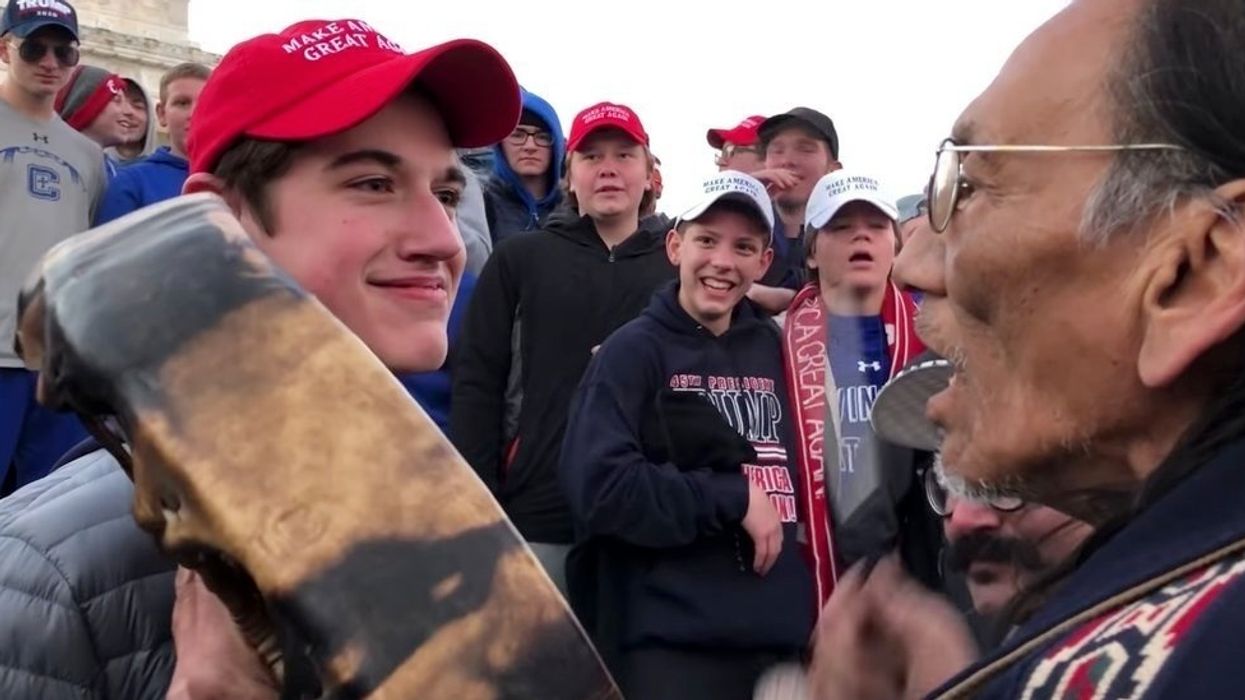
Image source: Video screenshot

A federal judge dismissed a lawsuit brought by former Covington Catholic student Nick Sandmann against five major news outlets that reported on a confrontation between Sandmann and a Native American activist at the Lincoln Memorial in January 2019.
Sandmann, who was 16 at the time, became the center of a national controversy after a video emerged that showed Covington (Kentucky) Catholic High School students standing in front of a Native American man who was banging a drum and chanting. The students were attending the March for Life that year, which coincided with the Indigenous Peoples March. Multiple media organizations reported that students — including Sandmann, who was wearing a "Make America Great Again" hat — had mocked, surrounded, and were trying to intimidate the man, Nathan Phillips, but additional video disproved those claims. Sandmann became a focal point of outrage and smears because he had smiled at the man in the video.
After it became clear that initial reporting of the incident was false, Sandmann filed defamation lawsuits against eight news organizations. Three companies settled with Sandmann, but on Tuesday, a federal judge threw out the remaining lawsuits against the New York Times, CBS, ABC, Gannett Co. Inc., and Rolling Stone.
Sandmann's attorney, Todd McMurtry, told the Lexington Herald-Leader he was "disappointed" with the decision from United States District Eastern Kentucky Court Judge William Bertelsman and planned to file an appeal.
“We’re fully prepared to argue these cases in the 6th Circuit," Sandmann said in a statement.
Bertelsman's opinion was centered on statements published by the news outlets in which Phillips had claimed Sandmann had "blocked" and "would not allow" him to retreat from the Lincoln Memorial.
Sandmann's legal team argued that the reports had "conveyed false and defamatory charges," and that the media companies had malicious intent in publishing them.
But the judge found that Phillips' statements about Sandmann's actions were "objectively unverifiable and thus unactionable opinions.”
"Instead, a reasonable reader would understand that Phillips was simply conveying his view of the situation. And because the reader knew from the articles that this encounter occurred at the foot of the Lincoln Memorial, he or she would know that the confrontation occurred in an expansive area such that it would be difficult to know what might constitute 'blocking' another person in that setting," Bertelsman wrote.
The judge said the press did not defame Sandmann by reporting Phillips' version of the incident, since his statements were opinions and not facts.
“The media defendants were covering a matter of great public interest, and they reported Phillips’s first-person view of what he experienced,” he wrote. “This would put the reader on notice that Phillips was simply giving his perspective on the incident.”
Bertelsman added, "Phillips' statement did not imply the existence of any nondisclosed defamatory facts, and only under such circumstances does a statement of opinion lose its constitutional protection."
“Therefore, in the factual context of this case, Phillips’s ‘blocking’ statements are protected opinions,” he concluded.